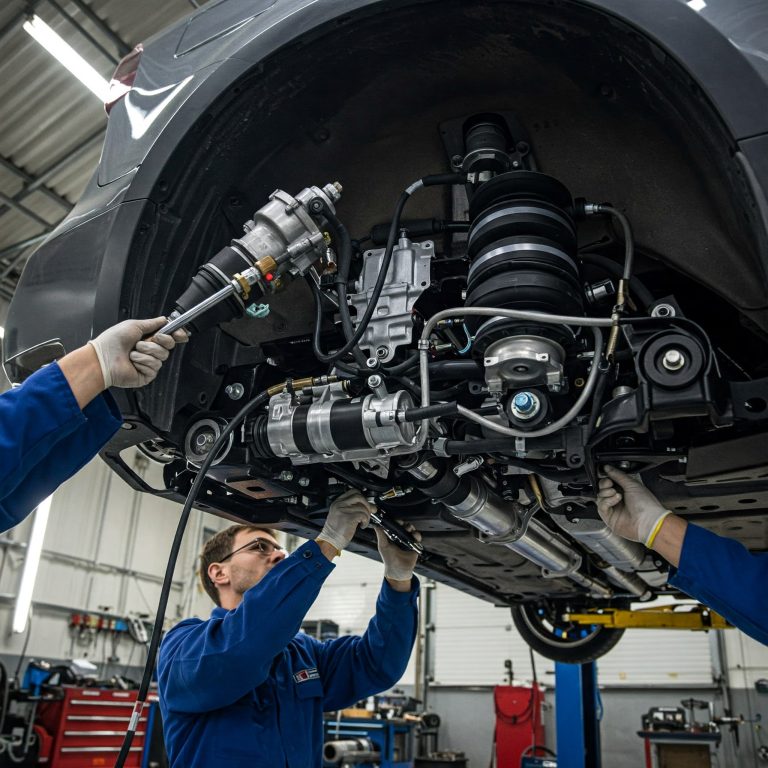
Which Fuel Will Power the Future of Cars?

As we look ahead to 2025, the debate between hydrogen and electric cars continues to heat up. Both options promise a cleaner, greener future, but which fuel will truly power the cars of tomorrow? Electric cars are already leading the charge, with widespread adoption and a growing network of charging stations. They’re easy to use, and their batteries can be charged at home or on the go. However, hydrogen cars offer some unique benefits, like faster refueling times and longer driving ranges. Plus, hydrogen fuel is made from water and can be produced using renewable energy sources, making it a strong contender in the push for sustainability. The real question is: will the infrastructure for hydrogen refueling be developed in time to compete with the growing electric car network? The future could see a mix of both technologies, each powering different kinds of vehicles based on their strengths.
A Look at How Hydrogen and Electric Cars Stack Up

Hydrogen and electric cars are both big players in the race for sustainable mobility, but they have different strengths. Electric vehicles (EVs) run on batteries that can be charged at home or at charging stations. They’re known for being environmentally friendly, with zero tailpipe emissions and lower operating costs. However, the downside is that battery technology still limits their driving range and charging time.
On the other hand, hydrogen cars use fuel cells to generate electricity and only emit water vapor. They can refuel quickly at hydrogen stations, offering a longer range compared to many electric vehicles. The challenge with hydrogen cars is that hydrogen production and infrastructure are still developing and not as widely available as electric charging stations.
In 2025, both technologies are making progress, but each has its own hurdles to overcome. The future of transportation could see a mix of both, depending on where you live and what you need in a car.
The Pros and Cons of Hydrogen vs. Electric Vehicles

Hydrogen and electric vehicles (EVs) both promise a cleaner future, but each comes with its own set of pros and cons.
Electric vehicles are popular because they are easy to charge at home, and the number of charging stations is growing fast. They’re also known for being energy-efficient and producing zero emissions while driving. However, EVs can take a while to charge, and long road trips can be tricky due to the limited range and charging stations.
Hydrogen vehicles, on the other hand, can be refueled in just minutes, like a gas car, and have a longer driving range than many electric cars. But hydrogen cars need specialized fueling stations, which are still rare, and hydrogen production can be expensive and environmentally taxing.
Ultimately, both options aim to reduce our reliance on fossil fuels, but they work in different ways. Whether hydrogen or electric vehicles win out will depend on how these challenges are solved.
Which is Better for the Environment: Hydrogen or Electric?

When it comes to being environmentally friendly, both hydrogen and electric cars have their strengths, but they each have their challenges.
Electric vehicles (EVs) are powered by batteries that can be charged with renewable energy, like solar or wind power, which makes them a clean option. The main environmental concern with EVs is the production and disposal of their batteries, which can involve mining for rare materials and energy use during manufacturing.
Hydrogen cars, on the other hand, use fuel cells to generate electricity from hydrogen gas. The biggest advantage of hydrogen is that, when it’s made from renewable sources, it produces zero emissions—just water vapor. However, producing and transporting hydrogen can still have a carbon footprint, depending on how it’s made.
Both options are better than traditional gas-powered vehicles, but for now, electric cars seem to have the edge when it comes to reducing environmental impact, especially as battery technology continues to improve.
How Far Can Each Technology Go in 2025?

As we look ahead to 2025, both hydrogen and electric vehicles (EVs) are pushing the limits of what’s possible in sustainable driving. Electric cars, already a popular choice, continue to improve with better battery technology, giving them a longer range on a single charge. By 2025, many electric cars will easily go over 300 miles on a single charge, making them a viable option for long road trips. However, charging infrastructure still needs to catch up in some areas.
On the other hand, hydrogen-powered vehicles are still in the early stages but offer some unique benefits. Hydrogen cars can be refueled in just a few minutes, similar to gasoline vehicles, and can potentially travel over 400 miles on a full tank. However, the challenge is building enough hydrogen fueling stations to make them practical for everyday use. Both technologies have a long way to go, but 2025 will be a crucial year for both.
What You Need to Know About Hydrogen and Electric Cars

When it comes to sustainable cars, hydrogen and electric vehicles (EVs) are leading the way. Both offer cleaner alternatives to traditional gas-powered cars, but they work very differently.
Electric cars run on electricity stored in batteries. These batteries can be charged at home or at public charging stations. The big advantage is that EVs don’t produce harmful emissions while driving, making them better for the environment.
On the other hand, hydrogen cars use hydrogen gas as fuel. This gas is stored in tanks and turned into electricity in the car’s fuel cell. The main benefit of hydrogen cars is that they can refuel quickly, like gas cars, and usually offer a longer driving range than many EVs. However, hydrogen infrastructure (like refueling stations) is still limited.
Both technologies are exciting and have their pros and cons. As we move into 2025, it’s likely that both types of vehicles will play a role in creating a cleaner future for transportation.
Will Hydrogen Cars Outshine Electric Ones in the Future?

As the world shifts towards cleaner energy, the debate between hydrogen and electric cars is heating up. Hydrogen cars, powered by fuel cells, offer fast refueling times and longer driving ranges compared to electric vehicles (EVs). This makes them an attractive option for long trips or heavy-duty transportation like trucks. However, the infrastructure for hydrogen refueling is still limited, and producing hydrogen can be energy-intensive, which raises environmental concerns.
On the other hand, electric cars have gained massive popularity due to their relatively lower cost, ease of charging, and established infrastructure. Battery technology is constantly improving, which is extending their range and decreasing charging time. While hydrogen cars have potential, they still face hurdles like high production costs and a lack of refueling stations.
Ultimately, it’s unclear whether hydrogen will outshine electric cars in the future, but both have a place in the race for sustainable mobility. It could depend on advancements in technology and infrastructure.
How These Two Clean Technologies Are Changing Driving

Hydrogen and electric cars are two technologies changing the way we drive and think about fuel. Electric vehicles (EVs) run on batteries that you charge up, offering a quiet, smooth ride with zero tailpipe emissions. As more charging stations pop up, EVs are becoming easier to own and use. On the other hand, hydrogen cars use a fuel cell to turn hydrogen gas into electricity, which powers the car. They can be refueled in minutes and have longer ranges than many electric cars, making them a great option for long drives.
Both technologies are pushing us toward a cleaner future by reducing pollution and cutting reliance on fossil fuels. While electric cars are already gaining popularity, hydrogen cars are starting to gain attention too, especially for their fast refueling and long range. Together, these two clean technologies are reshaping the driving experience and making a more sustainable world possible.
Electric or Hydrogen: Which One is Right for You?

When it comes to choosing between electric and hydrogen cars, it can be tough to decide which one is right for you. Electric vehicles (EVs) have become popular due to their simplicity and the convenience of charging them at home. They’re great for short commutes and are already well-supported by charging stations in many areas. Plus, they produce zero emissions, making them an eco-friendly option.
On the other hand, hydrogen cars are still emerging but offer some unique benefits. They’re quick to refuel and have a longer driving range compared to many electric cars, which makes them ideal for longer trips. However, hydrogen stations are not as widespread as EV charging points, which could be a limitation.
Ultimately, the choice depends on your driving habits. If you mostly drive locally and have easy access to charging stations, an electric car might be the best fit. But if you need a car for long-distance travel, a hydrogen car might be worth considering.
The Road Ahead: Can Hydrogen Compete with Electric Vehicles?

As we move toward a more sustainable future, the question on many people’s minds is: Can hydrogen cars compete with electric vehicles (EVs)? Both technologies promise cleaner, greener alternatives to traditional gas-powered cars, but they have key differences.
Electric cars have been around longer, with more charging stations and a solid network of support. They are easy to use, with fast recharging and long-range capabilities, making them a popular choice for drivers today. However, the range anxiety and long charging times remain issues for some.
Hydrogen vehicles, on the other hand, offer quick refueling and can travel longer distances on a single tank. But hydrogen refueling stations are still limited, and the technology is more expensive to produce.
In 2025, both hydrogen and electric vehicles will likely play important roles, but electric cars seem to be leading the race. Whether hydrogen can catch up depends on advancements in infrastructure and affordability.




